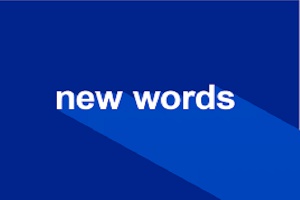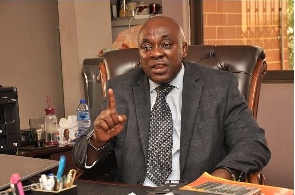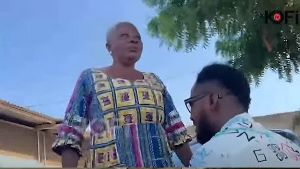 File photo: Some of these words already existed in some Ghanaian languages
File photo: Some of these words already existed in some Ghanaian languages
Every year, Ghanaians make up new words, as attempts to douse tensions which come with politics, public offices and social pressures. These words more often than not, gain attention on social media and spread to various spheres of Ghanaian life.
They are then used to ridicule personalities involved, as well as make issues light for casual conversations.
Some of these words already existed in some Ghanaian languages but some new meanings were given to them as they re-emerged in some controversies and trends.
In this article, GhanaWeb sheds some light on the top five words which made it to the Ghanaian dictionary in 2020 with new meanings.
1. Papa no.
‘Papa no’ in the local dialect Twi means ‘That man’ or ‘The man’ but in 2020 it entered the Ghanaian dictionary with a new meaning.
It first gained popularity during a social media battle between two Ghanaian public figures – singer Mzbel and actress Tracey Boakye.
‘Papa no’ in their banters was a code name of a man who they both reportedly had an amorous relationship with.
Since then, the simple meaning of the term metamorphosed into one which connoted a ‘sugar daddy’ – an older man who spends money on a younger lady in exchange for sex.
Pls the #VGMA21 no, is Papa no n Tracey Boakye prepping? What of Mzbel?
— Ama Etwepa (@etwepa) August 28, 2020
Dont know why the Papa No issue is such a big deal
— Kay ???? (@Kaypoisson1) August 17, 2020
If Mahama eat That Tracey Boakye girl, ibi big deal like that?
“ papa no woy3 a, )b3 we wo”
As he get money like what make he take do?
So Tracey Boakye has trended for one (1) week non-stop all bcos of the papa no.
— Mi Anyemi (@Mianyemi) August 18, 2020
I swear, the day we'll get to know the "papa no", he'll trend for life. ????????#kennedyagyapong #Shattawale #Sarkodie
2. Kumerica
Call it the Ghanaian ingenuity, but many refer to it as the Ghanaian way of having fun. In the middle of the year, Kumerica was creatively carved from Kumasi, the capital city of the Ashanti Region and America by some upcoming artistes.
This was not only to sell their music or celebrate their city but also gave rise to a whole movement which was heavily endorsed by several public figures.
Disciples of this movement and for that matter all people who live and identify themselves as people from the Ashanti Region were called ‘Kumericans’.
Faux flags, currencies, cloths and several other symbols of a sovereign entity were developed, in this regard.
Thank you Kumerica for the honorary award ????
— SHATTA WALE (@shattawalegh) December 19, 2020
•Influential Icon
•Project of the year ????#ARMA #AhodwoLasVegas #KIP2020 https://t.co/C9PjWLtnaH pic.twitter.com/yJ7SqemVRU
He's a church pastor in #Kumerica waving tithe money like Ghana flag....fellow Ghanaians???????????????????????????? pic.twitter.com/MjTeO2oEzT
— KI?G ØF AB£?KWA? (@iamdesmonds) October 18, 2020
...the only city with a flag #Kumerica ???????????????? pic.twitter.com/4GGLeZg1Tq
— Akwasi sInbAd (@AkwasiKwarten20) August 20, 2020
The official currency.????????#KUMERICA pic.twitter.com/eTmv0yMOo9
— MTN (@MtnTrouble) August 28, 2020
3. Flip-flop
The word flip-flop is widely known as a type of sandals, though it has quite a significant meaning in electronics.
But in 2020, it entered the Ghanaian dictionary as a political term which was used to ridicule the opposition National Democratic Congress.
‘Flip’ which was consistently used by Director of Elections for the NDC, Elvis Afriyie Ankrah during a press conference after the December 7 polls, courted some attention.
By using the word, the party communicated their confidence in capturing some parliamentary seats which initially belonged to the NPP.
The NPP, on the other hand, later added ‘flop’ to it to also call the bluff of the NDC.
“Flip-flop” since then to several Ghanaian, has become a political term for the two dominant parties in the country.
"The NDC has not learnt from the 2016 mistakes and incompetence." - John Boadu, General Secretary of NPP, after the NDC 'flip flop' press conference#NPPisWinningpic.twitter.com/TYdlaRP29t
— Maiestas ?? (@Ebenezer_Peegah) December 8, 2020
The God of NDC doesn’t wear Flip flop so he never flops when it comes to flipping the votes .
— JUST SHERLOCK ???? (@Ntiamoah_locked) December 8, 2020
Good morning. NDC has apparently flipped many NPP seats not knowing NPP too has flopped some NDC seats. Atikaatika...Flip Flop is the new name of the game.
— Sam Attah-Mensah (@Sammens) December 8, 2020
4. Yagyae
“Yagyae” in the local Twi dialect literally translates as “We’ve stopped”.
But how did this word enter the Ghanaian dictionary again? Some few weeks to Christmas, some Ghanaians started tweeting about things they intend to put a stop to, particularly in their relationships.
Not only that, it was also used to communicate some archaic practices people intend to discontinue in the new year.
It is not yet clear who started the trend but it was, as a matter of fact, heavily patronized.
Someone sent us a DM which read: “Please knock Hearts for us next time”
— GREAT OLYMPICS (@AccraGtOlympics) December 22, 2020
Mepawokyew saa Zanzama edwuma no yagyae wai.. #OlyDade
The "yagyae" thing is now trending on radios
— ANGEL TOPEDO ???? (@ThoughtPillow) December 22, 2020
Merry Christmas and a happy new year, forward to all your friends and families.
— Nungua Zayn Malik???????? (@WahidHansen) December 25, 2020
Saaa Father Christmas adwuma nu yagyae????????????
5. Fellow Ghanaians
Yes, Fellow Ghanaians is English and it is well understood. However, in 2020, shortly after the outbreak of the Novel Coronavirus it became synonymous to President Nana Addo Dankwa Akufo-Addo’s occasional address to the nation.
The president, during the period of lockdown (March – April) began to update Ghanaians on measures his government put in place to combat the virus.
Whether intentional or not, the president usually preceded his address with “Fellow Ghanaians”. Not long after, Ghanaians adopted the term and began using it for casual conversations, making jokes, and as a form of greeting amongst others.
More often, prior to the president’s addresses, “Fellow Ghanaians” would top social media trends all in anticipation of what government had to deliver.
The return of Fellow Ghanaians
— Boga Ali Hashim (@hashimghana) December 20, 2020
Showing tonight @8pm. Don't miss it. pic.twitter.com/A1LVYrG6YI
When you know you’ll still be hearing Fellow Ghanaians ?? pic.twitter.com/vSljhe0QUe
— Young Lord???????????????????? (@bra_eko) December 10, 2020
Fellow Ghanaians,
— Nungua Bruno Fernandes (@kwaku_talia) December 22, 2020
I know December’s salary comes early. January has 90 days, There is January pro and January pro max. You have been warned.#Rapperholic2020 pic.twitter.com/h5lYgj1Qyw
6. Akyem Mafia
‘Akyem’ is an Akan word used to describe a group of four states: Akyem Kotoku, Akyem Bosome. Asante Akyem and Akyem Abuakwa.
In the midst of extreme controversy over the Agyapa Royalties deal, the Bolgatanga Central MP Isaac Adongo, used the term, ‘Akyem Mafia and Sakawa Boys’ to describe President Nana Addo Dankwa Akufo-Addo and his relatives in government who have their roots in Akyem.
Though this did not settle well for those involved, it did not stop some Ghanaians from adopting as part of their everyday conversation. The term went as far as taking top spots on social media trends.
As it stands, the term is synonymous to a specific group of people in government who share family ties with the president.
The only person I dey want hear ein take for this perfume issue be Akyem Mafia????????????????????????????????????
— Sheldon The Creator (@kwadwosheldon) October 26, 2020
“Akyem Mafia” yet Nana Addo never got angry. He was walking around parading himself like Don Corleone. We say Akyem sakawa boys nor, chairman bore ????????????????#AKYEMSAKAWABOYS
— RIP Rawlings ???????? (@MKAgyemang) September 6, 2020
Hon Isaac Adongo writes;
— Nana Yaa Ayensu (@estherayensu1) September 5, 2020
Agyapa Royalties Fraud Is The Last Straw: The Akyem Sakawa Boys and Grandpas Must Go
Agyapa royalties deal is a big fraud on Ghana by Akufo-Addo and the Akyem Mafia. You mortgaged Getfund proceeds in excess of GHS25 billion for the ...
7. La Hustle and La Wu
The two terms are often used concurrently. They are part of the terms couched by the creative minds of social media fanatics to communicate the essence of hard work amongst the youth.
According to some tweeps, ‘La Hustle’ literally means ‘you have to work’ or simply ‘work hard’ and ‘La Wu’ which mostly comes after the former means “you’re doomed” or ‘you’re dead.’
An example of how it has been variously used is; “La Hustle nyE saa La Wu” to wit “You have to work hard or else you’re dead.”
Though these terms existed, it was given prominence after award winning rapper, Medikal highlighted them in his song. The song titled ‘La Hustle’.
As if this isn't heartbreaking enough, they'll come together and cook a banger like La Hustle o nny? saa a la wu. https://t.co/IplYCscquZ
— Kofi Wiredu™ (@Wiredu_) December 24, 2020
All those saying “la hustle ohh ny3 sa la wu” are all not tue hustlers they all receiving their monthly salaries ????
— Kelvin Acheampong (@KelvinA86716706) December 28, 2020
If you no hustle , 3ndi33r bronya ye di33r la wu oooo....????????
— lady???? (@MasonEfua) December 24, 2020
Why squad dey complain about #Rapperholic2020 tickets price???????????????? as na u dey sing “la hustle ooo ny3 saaa la wu” nu na what u dey figa?? Kwasia... “if u no get money hide your face, I ________________ ????????????????????
— GIK IS COMING (@emm_hatches) December 21, 2020
- 45 timelines, incidents and scandals that defined Ghana’s 7th Parliament
- Bone straight hair, Biker shorts and other women fashion trends that ruled in 2020
- Deadliest accidents of 2020 that took many Ghanaian lives
- 5 highs of Ghana's Finance Minister in 2020
- Akrobeto is GhanaWeb Entertainment Personality of the Year
- Read all related articles












